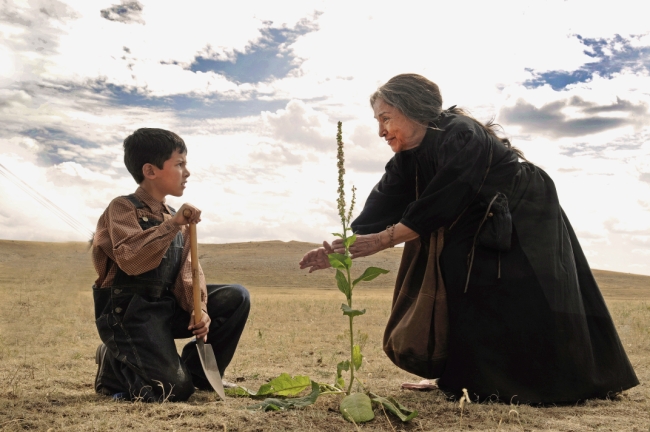Directed by Carl Franklin
Written by Carl Franklin
USA, 2013
Bless Me, Ultima seems designed for high-school English teachers desperate to spruce up their lesson plans near the end of a school year or semester. By itself, the film is sincere and earnest to a fault, and charming if too episodic and rushed, but referring to the book on which the film is based would presumably allow you to appreciate this condensed version a bit more. Bless Me, Ultima is apparently constrained by the strictures of feature-film conventions, specifically the idea that such a film must be short; the adaptation attempts to connect two disparate strands of a child’s coming of age, and as noble as the effort is, it doesn’t quite mesh.
Luke Ganalon plays Antonio, a little boy growing up in New Mexico, circa 1944. The story starts when Antonio’s parents (Benito Martinez and Dolores Heredia) invite the wise old Ultima, the midwife at his birth, to live with them in her autumn years. Soon enough, Antonio realizes that Ultima is a special healer, able to combat witchcraft with her own brand of magical medicine. He grapples with his Catholic faith, both in how he relates deeply and profoundly to Ultima, and to his place in the world among his classmates and family members. The chunk focusing specifically on Antonio’s connection with Ultima is compelling, as is his struggle to understand the difference between good and evil, hoping to gain a higher level of wisdom. Where Bless Me, Ultima falters is that both sections feel unfinished and totally untied to each other.
Writer-director Carl Franklin, returning to the silver screen after a decade-long hiatus since directing films like Out of Time and One False Move, does his best in bringing the famous novel by Rudolfo Anaya to the big screen. The film simply suffers because it’s unable to luxuriate in settings and expand its characters. Antonio’s childhood is marked with a lot of memorable events, few of which feel like they get developed fully cinematically. The first act sets us up to assume that Ultima will change Antonio’s life through her guidance as well as how she uses her healing powers. When she all but vanishes throughout most of the second act—except for a recurring threat from a bar owner whose daughters dabble in a darker magic than Ultima—it’s an inexplicable choice. Worse still, the title of the film comes into play in the final 10 minutes in a way that would be far more moving had she felt as vital to us as she apparently does to Antonio.
Ganalon, as with the rest of the cast, is winning if awkwardly mannered in his performance. The most recognizable names are Martinez, known for his work on FX’s The Shield, and Alfred Molina, who narrates the film as an adult Antonio. Molina has a fittingly authoritative voice, but the narration too often papers over what could be full scenes. The older Antonio tells us of how Ultima encouraged him to be respectful of the natural world around him, and of how he could broaden his mind. But we don’t see it happen except in short montages accompanying the narration, and rare is the lesson Antonio learns that we see him act upon in a later scene. Bless Me, Ultima, especially in these moments, is a patchwork quilt of a film connected by segments from the audiobook. Frankly, it’s kind of a shame, because what we’re left with is involving enough, as unable as the film is to commit to one story.
Even within the lesser vignettes, there are signs of surprising, intelligent life. The standout is the subplot where Antonio encounters a classmate who matter-of-factly admits that he doesn’t believe in God because of the loss of his parents at a young age. Diego Miró, as the boy, Florence, delivers an uncommonly pained performance. Anguish is etched into his face when he says “I can’t,” after being cajoled to go to confession so his sins can be washed clean. Through Florence, Antonio is meant to question his own faith; the friendship these two have is perhaps most fascinating for being unexpectedly direct. If only the film could give it more focus.
Bless Me, Ultima is, even for those who haven’t read Anaya’s novel, the kind of movie where it’s easy to imagine that the source material is better than the adaptation. Its director and cast are all able, and show a clear devotion to the book, but they can’t do much in 106 minutes without it all feeling hurried and lacking the proper context. The real shock for film fans comes in the end credits, as they see that the director of Devil in a Blue Dress has now directed an uncynical, un-pulpy (except in a few shots) Bildungsroman. Franklin isn’t, maybe, a forgotten auteur, but the open, innocent tone is something of a jolt from this filmmaker. His latest isn’t bad, but would probably make a better epic or miniseries, something with more patience to spare.
— Josh Spiegel






